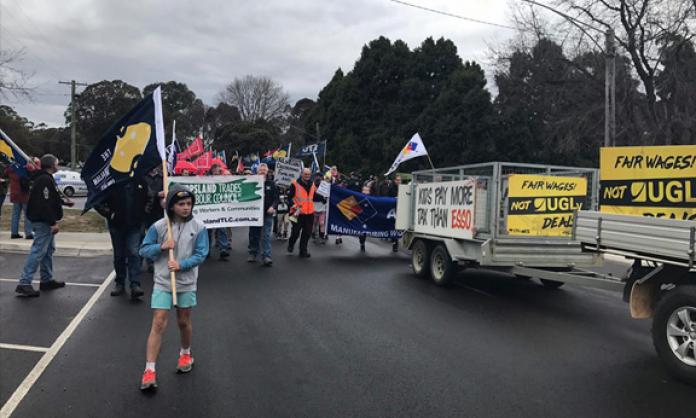“We are resolute … I’ve fought for wages and conditions over the 40 years that I’ve been a construction worker. This issue at hand now, there has never been a more important issue than this fight that we are standing for right now.”
Mal is a scaffolder-rigger. He has worked in the oil and gas industry, onshore and offshore in Bass Strait and on the North West Shelf, for almost 40 years. His labour, and that of his fellow workers, produces an extraordinary stream of profits.
The Bass Strait gas operation is jointly owned by Exxon Mobil (2016 profits: US$7.8 billion) and BHP (profits of $4.2 billion from June to December last year). Mal’s former employer is maintenance contractor UGL which was recently bought by the CIMIC group, (2016 profit of $580 million). But the figures don’t tell the whole story: Exxon Australia reported a profit of $38 million last year – but paid $574 million in “interest payments” to its US parent, a classic tax avoidance scam. The company regularly pays zero tax in Australia.
While the companies count the cash, they are working out new ways to slash the wages and conditions of the workers whose labour produces it.
UGL has created a shelf company that has now been awarded the contract for much of the maintenance – onshore and offshore – for the Bass Strait gas project. This “new” contractor is cutting wages by 30 percent. Workers will lose their current roster arrangements, which are one week on followed by one week off, and must work any roster imposed by management – two, three, or even more weeks at a stretch on an oil rig, followed by a week off that the employer can cancel at will.
All positions are regarded as casual. The inclement weather clause in the new agreement cuts pay for workers who can’t work because of rain – putting financial pressure on workers to keep working even in unsafe conditions.
In many ways, this dispute is a carbon copy of the epic 185-day dispute at CUB’s Abbotsford brewery last year. A set of workers at a key industrial site, enjoying decent wages and conditions that have somehow survived decades of enterprise bargaining and John Howard’s WorkChoices laws, are now having their conditions trashed. The method is the same – a bogus enterprise agreement, signed, in this case, by five workers in Western Australia with no connection to the Bass Strait workforce.
The maintenance workers and their unions, the AMWU, AWU and ETU, have been trying to negotiate under the Fair Work Act for new enterprise agreements. “There is nothing ‘in good faith’ about the way the companies skirt around these laws and dump these atrocious EAs on the table in front of us and tell us, if you don’t like it, stiff shit”, Mal explains. “This company has come to us and said, you will sign this agreement or you won’t have a job.”
Told by the company to take it or leave it, the workers have decided, overwhelmingly, to leave it. Mal and 200 of his workmates have been on a protest line outside the Longford gas plant near Sale, in Gippsland, Victoria, for the past four weeks. It’s where the Bass Strait gas is processed, refined and pumped out to Victoria and beyond.
On 14 July, the workers march through the streets of Sale. It seems a big event in the town: plenty of people come out of shops and offices to look, smile, wave, and clap the workers. It’s the last Friday of the school holidays, and there are plenty of kids in the crowd, bouncing along behind the hideous inflatable rat called Scabby. It’s obvious that this sort of protest, and the culture of community solidarity that lies behind it, is what these companies want to smash.
Chatting with workers on the protest, I hear plenty of stories – from onshore and offshore workers – of maintenance delayed by management, of junior engineers signing off on faulty components, of spills that are covered up or downplayed. It’s nearly two decades since management’s “tick a box” approach to safety resulted in a catastrophic explosion at the Longford gas plant that killed two men. Of course, dealing with a less secure, less unionised workforce is an easier proposition for any company that wants to cut corners on safety.
As well as standing up for themselves, their fellow workers and their community, these workers know that they are the front line for all workers across the country. As one of the marchers points out to me, if well-unionised and industrially powerful workers, such as the Esso workers, can have their conditions trashed, it’s open season. Out of 200 workers affected by the dispute, only a few have signed on to the new conditions. Their names feature on a “board of honour” propped against Scabby at the gas plant protest line.
The rally is addressed by ALP leader Bill Shorten, who pledges to fix Australia’s “broken” industrial laws. Mal and other workers welcome the pledge. But they know this battle will be fought, and won or lost, well before then.
“This is bigger than just a wage negotiation”, Mal explains. “It has far reaching tentacles if we let this run. We don’t want this to run any more. We want to stop it. We will not go away. We are resolute and we are going to see this through.”












